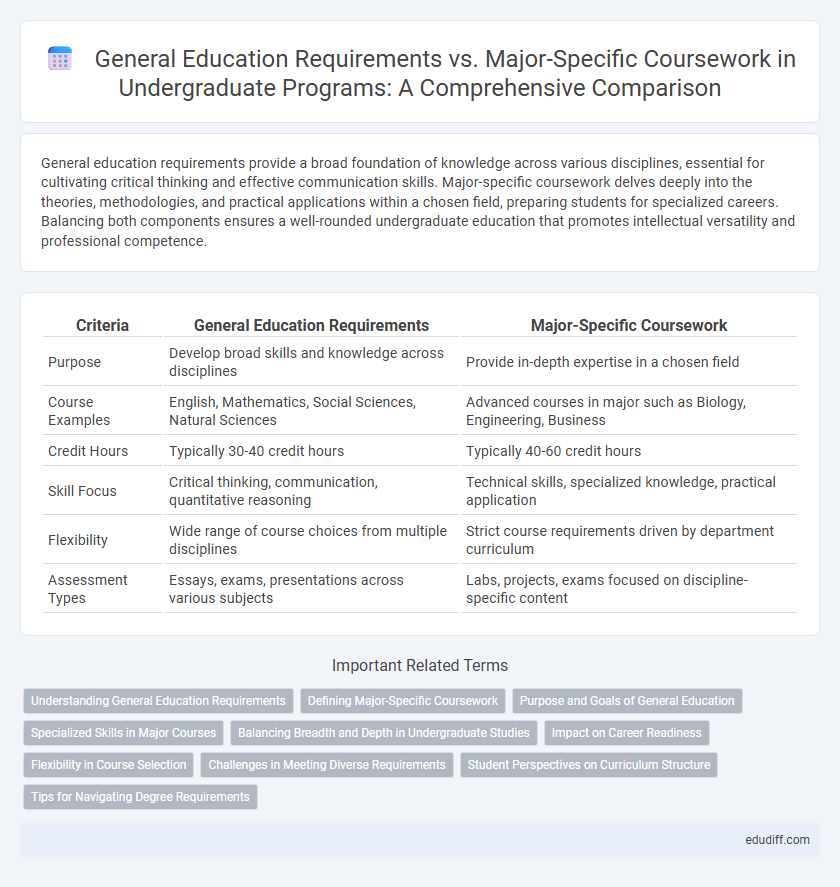General education requirements provide a broad foundation of knowledge across various disciplines, essential for cultivating critical thinking and effective communication skills. Major-specific coursework delves deeply into the theories, methodologies, and practical applications within a chosen field, preparing students for specialized careers. Balancing both components ensures a well-rounded undergraduate education that promotes intellectual versatility and professional competence.
Table of Comparison
| Criteria | General Education Requirements | Major-Specific Coursework |
|---|---|---|
| Purpose | Develop broad skills and knowledge across disciplines | Provide in-depth expertise in a chosen field |
| Course Examples | English, Mathematics, Social Sciences, Natural Sciences | Advanced courses in major such as Biology, Engineering, Business |
| Credit Hours | Typically 30-40 credit hours | Typically 40-60 credit hours |
| Skill Focus | Critical thinking, communication, quantitative reasoning | Technical skills, specialized knowledge, practical application |
| Flexibility | Wide range of course choices from multiple disciplines | Strict course requirements driven by department curriculum |
| Assessment Types | Essays, exams, presentations across various subjects | Labs, projects, exams focused on discipline-specific content |
Understanding General Education Requirements
General education requirements provide a broad foundation across multiple disciplines, essential for cultivating critical thinking, communication, and analytical skills in undergraduate students. These courses often include subjects such as humanities, social sciences, natural sciences, and mathematics, ensuring a well-rounded academic experience beyond major-specific knowledge. Understanding general education requirements helps students balance their curriculum, fostering intellectual versatility and preparing them for diverse career paths.
Defining Major-Specific Coursework
Major-specific coursework refers to classes that directly relate to a student's chosen field of study, providing in-depth knowledge and skills essential for their academic and professional development. These courses often include specialized topics, advanced theory, and practical applications that are integral to the major, distinguishing them from general education requirements. Fulfilling major-specific coursework typically plays a critical role in preparing students for career opportunities and graduate studies within their discipline.
Purpose and Goals of General Education
General Education Requirements provide a broad foundation of essential skills and knowledge, fostering critical thinking, effective communication, and cultural awareness across diverse disciplines. These courses aim to develop well-rounded individuals capable of adapting to various professional and social contexts. In contrast, Major-Specific Coursework focuses deeply on specialized expertise and technical skills necessary for a chosen field, preparing students for career-specific challenges.
Specialized Skills in Major Courses
Major-specific coursework develops specialized skills tailored to a student's chosen field, emphasizing practical applications and in-depth knowledge critical for professional success. General education requirements provide a broad foundation in key disciplines such as humanities, sciences, and social sciences, fostering critical thinking and communication skills. Focusing on specialized skills in major courses enhances technical proficiency and industry-relevant expertise essential for career readiness and advanced academic pursuits.
Balancing Breadth and Depth in Undergraduate Studies
General education requirements ensure undergraduates gain broad knowledge across disciplines such as humanities, sciences, and social sciences, fostering critical thinking and communication skills. Major-specific coursework provides in-depth expertise and technical proficiency within a chosen field, preparing students for specialized careers. Balancing these curricular elements enhances intellectual versatility and professional readiness, enabling well-rounded academic development.
Impact on Career Readiness
General Education Requirements build foundational skills in critical thinking, communication, and quantitative reasoning that enhance adaptability across various industries. Major-Specific Coursework provides specialized knowledge and technical expertise directly applicable to targeted career paths, increasing job proficiency and employability. Together, these curricula components foster a balanced skill set that improves overall career readiness by combining broad competencies with focused professional training.
Flexibility in Course Selection
General education requirements provide undergraduate students with a broad foundation across multiple disciplines, ensuring well-rounded knowledge and skills. Major-specific coursework offers targeted expertise in a chosen field, but general education courses often allow more flexibility in selecting subjects that align with personal interests or career goals. This flexibility enables students to explore diverse topics while fulfilling degree requirements, enhancing both academic development and interdisciplinary understanding.
Challenges in Meeting Diverse Requirements
Undergraduate students often face significant challenges balancing general education requirements with major-specific coursework, as both demand distinct skills and time commitments. General education courses emphasize a broad knowledge base and critical thinking, while major-specific classes require specialized expertise and deeper technical understanding. This dual demand can lead to scheduling conflicts, increased workload, and difficulty in maintaining academic performance across diverse subjects.
Student Perspectives on Curriculum Structure
Undergraduate students often perceive general education requirements as essential for developing critical thinking and broad knowledge, while viewing major-specific coursework as vital for acquiring specialized skills and professional preparation. Balancing these two components can shape academic satisfaction and influence career readiness, as students value diverse learning experiences alongside in-depth expertise. Surveys indicate that clear curriculum structure and integration between general and major courses enhance student engagement and perceived educational value.
Tips for Navigating Degree Requirements
Prioritize creating a balanced schedule that fulfills both General Education Requirements and Major-Specific Coursework to ensure steady academic progress. Use academic advising resources to clarify degree requirements and plan course sequences effectively. Track completed credits and prerequisites meticulously to avoid delays in graduation and optimize elective choices for skill development.
General Education Requirements vs Major-Specific Coursework Infographic

 edudiff.com
edudiff.com